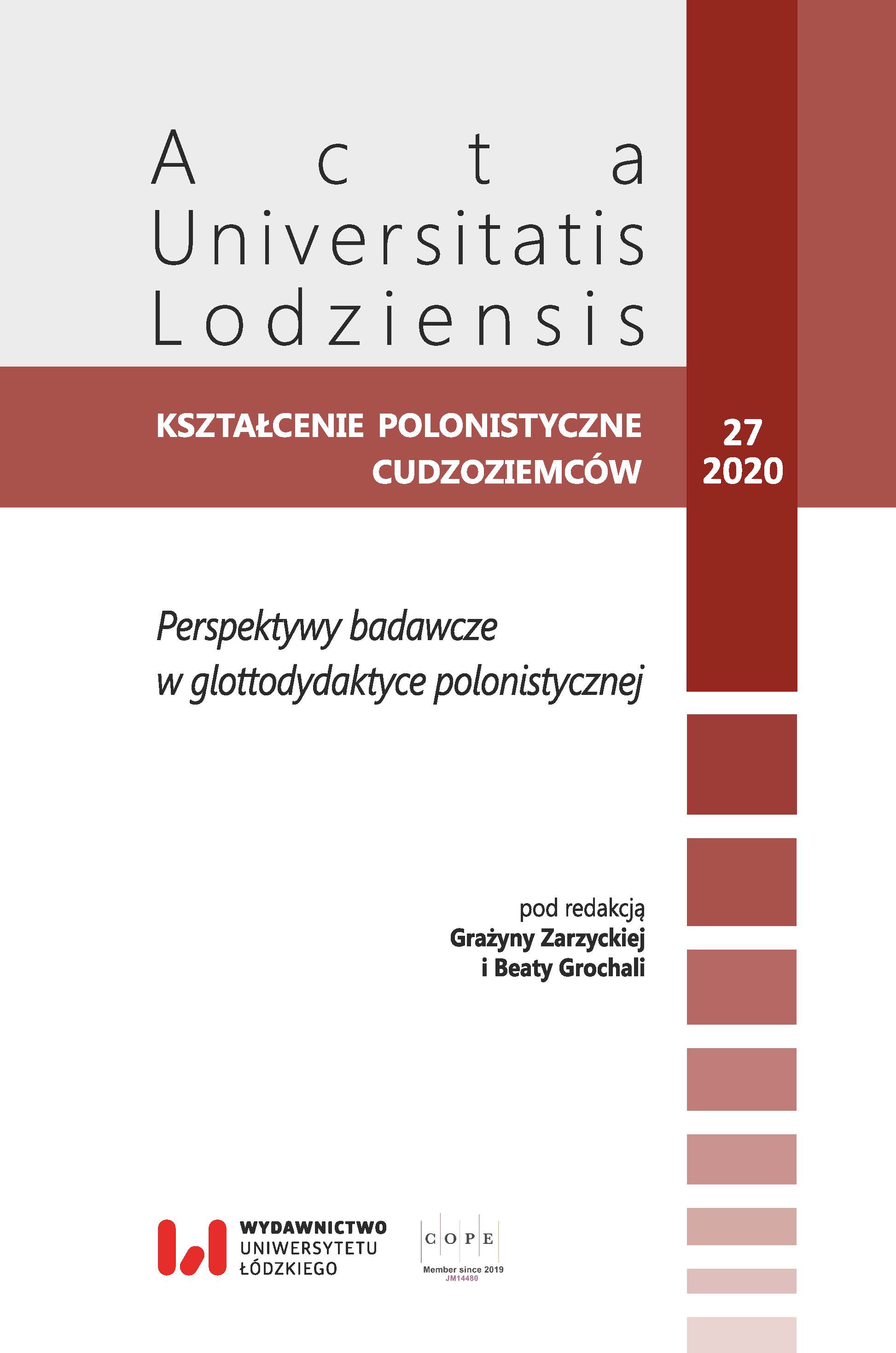Zadaniowa koncepcja kształcenia językowego w materiałach do nauczania języka polskiego jako obcego
DOI:
https://doi.org/10.18778/0860-6587.27.30Słowa kluczowe:
materiały dydaktyczne, zadanie, podejście zadaniowe, nauczanie języków obcych, nauczanie języka polskiego jako obcegoAbstrakt
Pod koniec minionego stulecia w ramach metodologii komunikacyjnej zrodziła się potrzeba dostosowania systemu nauczania języków obcych do wymogów zmieniającej się rzeczywistości. Europejski system opisu kształcenia językowego Rady Europy (2003) zaprezentował nową wizję komunikacji i nowe ujęcie kompetencji użytkowników języka: komunikacja jest działaniem. Stąd zrodziło się pojęcie podejścia ukierunkowanego na działanie. W podejściu tym zaproponowano specyficzny sposób rozwijania sprawności komunikacyjnych, który polega na wykonywaniu zadań osadzonych w kontekstach środowiskowych i sytuacyjnych. Zasady nauczania i uczenia się zadaniowego od kilku lat przenikają do dydaktyki języka polskiego jako obcego. Niestety, mimo dość dobrze rozbudowanej bazy teoretycznej podejścia ukierunkowanego na działanie i zadaniowego brak jest nadal kompleksowych materiałów praktycznych i podręczników, które rozpropagowałyby założenia europejskiej polityki językowej w glottodydaktyce polonistycznej.
Artykuł pokazuje, jak zastosować podejście zadaniowe w praktyce pedagogicznej. Zaprezentowana zostanie koncepcja podręczników zadaniowych, powstających w Centrum Języka i Kultury Polskiej w Świecie Uniwersytetu Jagiellońskiego, która wpisuje się w najnowsze tendencje współczesnej glottodydaktyki. Odpowiada ona potrzebie uczenia języka żywego, autentycznego, który jest przede wszystkim narzędziem do wykonywania rozmaitych zadań o charakterze społecznym.
Bibliografia
Bachman L., Palmer A, 1996, Language Testing in Practice: Designing and Developing Useful Language Tests, Oxford.
Google Scholar
Bednarska D., Machowska J., Majcher-Legawiec U., Rabiej A., 2020, RAZEM po polsku. Podręcznik do nauki języka polskiego jako obcego. Poziom A2, Kraków [w druku].
Google Scholar
Breen M., 1987, Learner contribution to task desing, w: C. Candlin, D. Murphy (red.), Language Learning Task, London, s. 23–46.
Google Scholar
Bucko D., Prizel-Kania A., Rogala D., 2020, RAZEM po polsku. Podręcznik do nauki języka polskiego jako obcego. Poziom B1, Kraków [w druku].
Google Scholar
Bygate M., Skehan P., Swain M., 2001, Introduction, w: M. Bygate, P. Skehan, M., Swain (red.), Researching Pedagogic Tasks: Second Language Learning, Teaching, and Testing, London & New York, s. 1–20.
Google Scholar
Carroll J.B., 1993, Human Cognitive Abilities, New York.
Google Scholar
DOI: https://doi.org/10.1017/CBO9780511571312
Crookes G., 1986, Task Classification: A Cross-Disciplinary Review, Honolulu.
Google Scholar
Demaizière F., Narcy-Combes J.-P., 2005, Méthodologie de la recherche didactique: nativisation, tâches et TIC, „Alsic”, t. 8, nr 1, s. 45–64.
Google Scholar
DOI: https://doi.org/10.4000/alsic.326
Ellis R., 2003, Task-Based Language Learning and Teaching, Oxford.
Google Scholar
Ellis R., 2006, The Methodology of Task-Based Teaching, „Asian EFL Journal”, nr 8(3), s. 19–45.
Google Scholar
Ellis R., 2009, Task-based language teaching: sorting out the misunderstandings, „International Journal of Applied Linguistics”, t. 19, nr 3, s. 221–246.
Google Scholar
DOI: https://doi.org/10.1111/j.1473-4192.2009.00231.x
ESOKJ – Europejski system opisu kształcenia językowego: uczenie się, nauczanie, ocenianie, 2003, Warszawa.
Google Scholar
Janowska I., 2004, Refleksyjne nauczanie gramatyki, „Języki Obce w Szkole”, nr 6, s. 40–48.
Google Scholar
Janowska I., 2011, Podejście zadaniowe do nauczania i ucznia się języków obcych. Na przykładzie języka polskiego jako obcego, Kraków.
Google Scholar
Janowska I., 2019, Wypowiedź ustna w dydaktyce językowej. Na przykładzie języka polskiego jako obcego, Kraków.
Google Scholar
DOI: https://doi.org/10.12797/9788376389233
Janowska I., Rabiej A., 2014, Zadanie jako forma wspierania refleksyjnego nauczania gramatyki, „Neofilolog”, nr 43/2, s. 235–247.
Google Scholar
DOI: https://doi.org/10.14746/n.2014.43.2.8
Kruszewski K., 2005, Sztuka nauczania. Czynności nauczyciela, Warszawa.
Google Scholar
Long M., 1985, Input and Second Language Acquisition Theory, w: S. Gass, C. Madden (red.), Input in Second Language Acquisition, Rowley, s. 377–393.
Google Scholar
Long M., 1991, Focus on form: A design feature in language teaching methodology, w: K. De Bot, R. Ginsberg, C. Kramsch (red.), Foreign language research in cross-cultural perspective, Amsterdam, s. 39–52.
Google Scholar
DOI: https://doi.org/10.1075/sibil.2.07lon
Nissen E., 2011, Variations autour de la tâche dans l’enseignement/apprentissage des langues aujourd’hui, „Alsic”, nr 14, http://alsic.revues.org/2344 [dostęp: 20.05.2020].
Google Scholar
DOI: https://doi.org/10.4000/alsic.2344
Nunan D., 1989, Designing Tasks For The Communicative Classroom, Cambridge.
Google Scholar
Nunan D., 2004, Task-Based Language Teaching, Cambridge.
Google Scholar
DOI: https://doi.org/10.1017/CBO9780511667336
Prabhu N.S., 1987, Second Language Pedagogy, Oxford.
Google Scholar
Prizel-Kania A. 2013, Rozwijanie sprawności rozumienia ze słuchu w języku polskim jako obcym, Kraków.
Google Scholar
Richards J.C., 2006, Communicative Language Teaching Today, Cambridge.
Google Scholar
Richards J.C., Rodgers T., 2001, Approaches and Methods in Language Teaching, New York.
Google Scholar
DOI: https://doi.org/10.1017/CBO9780511667305
Samuda V., Bygate M., 2008, Tasks in second language learning, New York.
Google Scholar
DOI: https://doi.org/10.1057/9780230596429
Skehan P., 1998, A Cognitive Approach to Language Learning, Oxford.
Google Scholar
DOI: https://doi.org/10.1177/003368829802900209
Willis D., Willis J., 2007, Doing Task-based Teaching, Oxford.
Google Scholar
Willis J., 1996, A Framework for Task-Based Learning, London.
Google Scholar
Pobrania
Opublikowane
Jak cytować
Numer
Dział
Licencja

Utwór dostępny jest na licencji Creative Commons Uznanie autorstwa – Użycie niekomercyjne – Bez utworów zależnych 4.0 Międzynarodowe.










